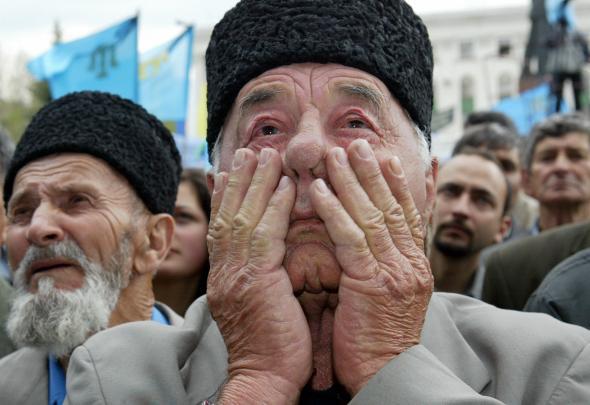The Guardian’s Luke Harding writes, “spare a thought, meanwhile, for Crimea’s Tatars. They are the peninsula’s original Turkic-speaking Muslim inhabitants. Well-educated and politically organised, they now number 300,000, 15% of Crimea’s population. They want to remain part of Ukraine.”
Indeed, Crimea’s Tatar population, whcih has primarily supported the anti-Yanukovych protest movement and opposed Russian nationalists in its own region, is feeling understandably worried. After clashes between Tatar groups and pro-Russian protesters that left two people dead and dozens injured, community leaders have urged Tatars to stay at home following today’s events.
Tatars are certainly have a grim history of being scapegoated. In 1944, after Soviet forces regained control of Crimea and two and a half years of German occupation, Joseph Stalin ordered that the entire population be deported under the pretense that they had collaborated with the Nazis. (It was a false accusation: Quite a few Tatars had fought in the Soviet army.)
Officers from the NKVD, predecessor to the KGB, went from home to home ordering Tatars onto cattle trains. More than 180,000 people were deported, most of them to Uzbekistan. Many died on the trains, many more in their new homes, where they found a harsh climate, and local inhabitants unprepared and unenthusiastic about supporting the new arrivals. About 46 percent of the exiles died.
In 1953, after Stalin’s death, the charge of mass collaboration was withdrawn from the Tatars(though the accusation is still periodically made today), but they were not allowed to return home until the late 1980s. Tatars argue that the deportation should be considered genocide. Though generally pro-Ukrainian in their politics, they have pressed Kiev to do more to help them recover their land and property and called on Europe to make the recognition of Tatar rights a condition of EU membership.
Now, of course, their problems seem to have multiplied dramatically.
